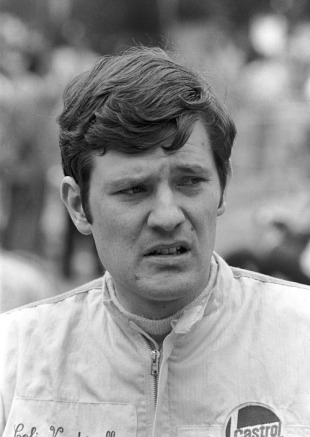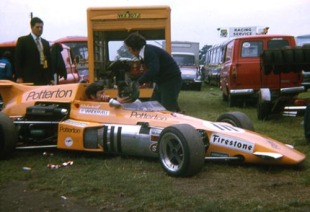
During my 40-odd years in motor racing as a journalist, PR man, promoter, team manager, and broadcaster I've worked with many drivers, including a number of world champions, but my favourite driver is an eccentric Englishman called Colin Vandervell. He may never have made it to Formula One, but he's certainly one of the most the most naturally-gifted racers to cross my path. Added to that he was a dab hand at rallying ,and I had the opportunity to see that at first hand on two RAC Rallies.
He was the son of the industrialist Tony Vandervell, the man behind the Vanwall racing cars and as a boy was a regular at F1 events. But he first made the headlines when he was kidnapped. At the time he was a pupil at Stowe School, from which he regularly escaped to sneak into Silverstone.
Being the son of a multi-millionaire had its drawbacks - his father banned him from racing as several of the team boss' friends and drivers had been killed racing. So it wasn't until after his father's death that Colin took to the circuits. His early motorsport career embraced both karting and rallying. An early rally car was an ex-Tom Trana factory Volvo which he sold to Williams' Patrick Head. It was the karting that brought him success in the late 60s and he was a member of British karting team. Indeed, from then on he proudly wore the special team helmet of green with the red, white and blue stripes.
He moved into Formula Ford in 1969, first with a Lotus 61, racing for Lotus garage Bell & Colville. But for 1970 he acquired the ex-Emerson Fittipaldi "Magic" Merlyn Mk11. He was a sensation, winning 29 races, the British Formula Ford Championship, the Premier Grovewood Award, and lost the European Championship by a handful points because the organisers thought he was too inexperienced to enter the first round.
At the time I was running the factory March Formula 3 team and we were having a torrid time. Our main drivers were Tom Walkinshaw [who latter established TWR] and Ian Ashley - but Ashley had a few too many accidents and Robin Herd suggested we find a replacement. So I contacted Vandervell and suggested he come and try the car at Silverstone. He was sensationally fast, broke the lap record in the unloved March 703 and we signed him that day. He managed to fit the final few F3 races of the season along with his Formula Ford commitments. This was the last year of the one-litre screamers and he gave us the best results of the year
The following year I had returned to a life of journalism with some race management on the side. By now Vandervell and I were firm friends and we put together a deal to run a Brabham in Castrol colours. It was a tricky year and the Brabham was no longer a competitive car, but considerable success came after we switched to a Vegantune engine, following in the footsteps of Alan Jones.

There was success too in an Escort Mexico, trading paint with the likes of Scheckter and Gerry Marshall. The car was then converted into rally car for that year's RAC Rally and I joined him as co-driver. Although I shared a flat at the time with two RAC Rally-winning co-drivers I had never competed in a Rally. Seeded near the back and serviced by two guys in a Mini van we had a sensational run, but with a class win in our sights the gearbox broke in Yorkshire. Not bad for a racing driver and a journalist on their first rally.
The big year was 1973. There was an assault on two Formula Atlantic Championships in the Triplex March 732 plus a part season in Formula 2 also in a factory March. Vandervell won the Yellow Pages championship, the more senior of the Atlantic championships against strong opposition. The RAC Rally was tackled in a full David Sutton GP4 Escort Mk2. Again we were doing well until a roll in Wales led to a broken axle, and a wheel and drive shaft that arrived with the service crew about ten second before we did.
All this was achieved by a guy who was very much a part-time racer because Colin was a financial wheeler-dealer with property, currency and investments interests which he ran from smart offices near Piccadilly. It wasn't unknown for him to come in during a practice session, head to the nearest pay phone (no mobiles then), complete a deal and return to the car. I got the impression he got a bigger kick out of that than the racing. He had all the talent but lacked the motivation.
His race uniform was unconventional too. In those days you could buy two piece Nomex race suits. Depending on how he felt, he might wear the top half with green corduroy trousers, and always his old school socks with the name tags in them.
On the back of his 1973 success, I had secured a chance of a test for him with the Cooper Formula One team for 1974 but he wasn't the slightest bit interested. It was understandable because he'd been following Gerry Birrell at Rouen in the F2 race when the hugely-talented Scotsman crashed under the Armco barrier and was decapitated. He had also been affected by the death of Williamson the 1973 Dutch Grand Prix.
He decided to concentrate on his business interests and spent a couple of years racing a Ford Capri in the BTCC which I don't think he enjoyed that much. He later moved to Monaco where he worked closely for awhile with Scheckter and Guy Edwards. When I saw him a couple of years ago, he was still up to speed with the racing gossip and had hardly appeared to have aged.
On the road he was a total lunatic, often using the pavement to make his way through traffic. We were once heading down a French Autoroute and he burst out laughing. The trailer was wider than our tow car and he had lined it up so the trailer wheels were hitting the cones from road works. I think he scattered about two kilometres' worth!
Acting as his team manager was challenging because he was pretty keen on slapping down the protest fees. At one Brands Hatch F3 race we protested the weight of the six cars in front of us - they were weighed and were all under the limit. Somehow the officials couldn't find the weigh bridge certificate so the protest failed. On another occasion we got Patrick Depailler disqualified after he overtook Vandervell under a yellow.
His racing success in the 1970s was achieved with a minimum of effort. Even after a pole position lap he would have barely a bead of sweat on him and was completely nonchalant about the whole thing. In different times and different circumstances I am convinced he would have been a grand prix winner.
Andrew Marriott is a freelance Motorsport commentator and journalist

